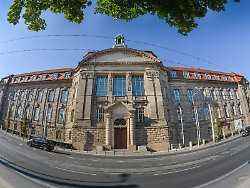Habeck’s house is progressing
This is how the federal ministries want to save energy
7/15/2022 8:24 am
Politicians should do what citizens can do. At least that seems to be the conviction of many federal ministries when it comes to saving electricity. Faced with an impending energy shortage in winter, some houses are already starting to do this.
In view of the energy crisis, the federal government wants to set a good example and focus on economy. In many ministries, cooling is already being shut down, and savings are also to be made on heating. Some houses are still examining what can be done, according to a survey by the German Press Agency. And some ministries have planned more extensive measures than others.
According to the Federal Ministry for Economic Affairs and Climate Protection, it wants to save around 15 percent on heating energy from autumn. Among other things, the temperature should be lowered longer at night. In the summer, the house of department head Robert Habeck even wants to save 40 percent of the energy. Air-conditioned rooms should only be cooled down to 26 degrees Celsius – the only exception are server and technical rooms, where stronger cooling is indispensable for technical reasons. For comparison, the Health and Defense Departments said they set the room temperature to 22 degrees Celsius.
The Foreign Office has already taken various measures to save energy, the ministry said. Among other things, refrigeration systems were switched off and solar or photovoltaic systems were installed on the roof. For better heat protection in summer, reflective window films should also be attached. According to the information, only a few rooms are cooled inside. “Up to an outside temperature of 30 degrees, the inside temperature is set at 24 degrees,” said Annalena Baerbock from the ministry. With an outside temperature of over 30 degrees Celsius, the inside temperature also rises.
The employees are also asked
The CDU energy politician Andreas Jung generally demanded ambitious energy savings from the ministries. “Do not cool further than 26, 27 degrees. Save on lighting. Save on heating where possible. If every public building does that, something will come together,” said Jung to the “Welt” TV channel earlier this week. It would also signal that the situation was serious. “We have to do something now, we’re not just appealing to others, we’re starting where we can do something ourselves,” stressed Jung.
The employees of the Federal Ministry for Family Affairs also have to do something themselves: Since there is neither air conditioning nor a central temperature setting on the radiators in the premises, the ministry is dependent on climate-conscious behavior on the part of its employees. They are asked to set the heating as low as possible and to turn the temperature down further when they are absent, said a spokeswoman.
There is also no air conditioning in many other official buildings of the federal ministries, for example in the premises in large parts of the Federal Ministry of Food and Agriculture, in parts of the Ministry of Health, the Ministry of Defense or in the Federal Ministry for Economic Cooperation and Development.
The Federal Ministry of the Interior uses an energy-efficient geothermal system that uses geothermal energy. A spokesman announced that district heating would only be used if this was not sufficient. In addition, a photovoltaic system was recently installed on the roof of the building. A reduction of the room temperature in the coming heating period is currently being examined.
EU system to save energy
Seven of the fifteen federal ministries stated that they had introduced an environmental management system developed by the EU – or that they intend to do so. With this system, ecological and economic weaknesses in organizations can be eliminated and material, energy and thus costs can be saved. This was confirmed by the Ministries of Transport, Education, Environment, Labour, Finance and Development as well as the Federal Foreign Office. According to a spokeswoman for the Federal Ministry of Education and Research, the system is to be introduced in all top federal authorities by 2025.
In addition, the Ministry of Finance, the Ministry of Education and the Ministry of the Environment stated that they had reduced or partially switched off hot water treatment. In addition, lighting systems that are not relevant to safety are to be switched off in many ministries – including the Ministry of the Interior, the Ministry of Labor and the Ministry of Finance. In the Federal Foreign Office, old lamps with high energy consumption are being replaced with energy-saving LED lamps.
Last week, the Council of Elders decided that the offices for members of the Bundestag, their employees and the Bundestag administration should only be heated to 20 instead of the previous 22 degrees in winter. While the air conditioning systems used to ensure a pleasant 24 to 26 degrees in summer, depending on the outside temperature, it will be 26 to 28 degrees in the future.
